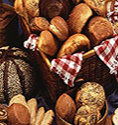Plant sterols, phytosterols, are cholesterol-like compounds that are found mostly in vegetable oils, nuts and legumes. About 44 phytosterol types are known to exist in plants. The most abundant phytosterols are, however, beta-sitosterol, campesterol, and stigmasterol. Phytosterols are not produced in the body. Thus, their sole source is plant-based diet.
Phytosterols have the same function as cholesterol in the body. The advantage of phytosterols is that they don't have the side effects associated with high cholesterol foods. Plant-based diet rich in phytosterols is known to reduce serum total cholesterol and low density lipoprotein (LDL), 'bad', cholesterol. In contrast, animal-based diet (meat, egg etc.) contributes to elevated serum cholesterol level. For example, one study found that subjects fed with wheat germ containing high phytosterol had 42% lower cholesterol in their blood as compared to those who were fed phytosterol-free wheat germ.
Phytosterols help reduce blood cholesterol, possibly, by enhancing excretion of cholesterol, interfering with cholesterol production, and competing for cholesterol acceptor sites in the intestinal walls.
Some animal studies have also shown that phytosterols inhibit or slow down tumor development.
A conventional Western diet provides 250 mg/day of phytosterol, on average. Whereas a vegetarian diet provides 2 times of that.
For children older than 2 years with history of high blood cholesterol in their families up to 2 grams of phytosterols per day is recommended by an Expert Panel on integrated guidelines for cardiovascular health and risk reduction in children and adolescents.
Generally, the highest phytosterol content is found in plant oils and to a lesser extent in vegetables and fruits. In the following table is a list of foods high and low in phytosterols. The phytosterol content is the sum of beta sitosterol, campesterol, and stigmasterol.
Note: Some food items are duplicated and with different phytosterol levels, because the data is from multiple sources.
Phytosterols in Vegetable Oils, Vegetables and Fruits
| Phytosterol food sources | Total phytosterol content (mg/100g) |
|---|---|
| Oils | |
| Rice bran | 1055 |
| Corn | 952 |
| Sesame | 865 |
| Wheat germ | 553 |
| Safflower, high oleic | 444 |
| Sheanut | 357 |
| Flax seed | 338 |
| Cottonseed | 327 |
| Poppyseed | 276 |
| Almond | 266 |
| Soybean | 221 |
| Olive | 221 |
| Peanut | 206 |
| Cocoa butter | 201 |
| Grapeseed | 180 |
| Walnut | 176 |
| Olive | 176 |
| Hazelnut | 120 |
| Sunflower | 100 |
| Coconut | 91 |
| Palm | 49 |
| Vegetables | |
| Beet root | 25 |
| Brussels sprout | 24 |
| Cauliflower | 18 |
| Onion | 15 |
| Carrot | 12 |
| Cabbage | 11 |
| Yam | 10 |
| Fruits | |
| Orange | 24 |
| Banana | 16 |
| Apple | 12 |
| Cherry | 12 |
| Peach | 10 |
| Pear | 8 |
On the next page are nuts and legumes rich in phytosterols.



